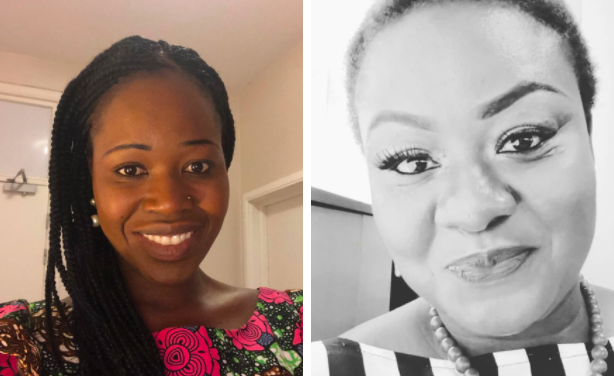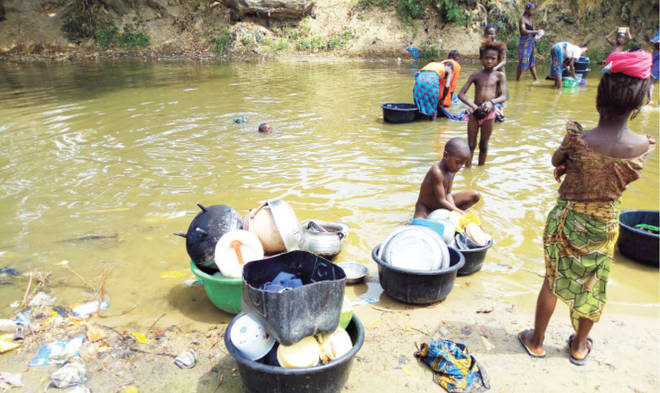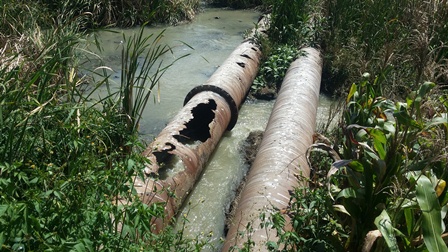Reporting on water disease has been a common thread of both CCIJ members Adie Vanessa Offiong and Wendy Muperi’s careers as investigative journalists. Offiong, who is from Nigeria, and Muperi, who is from Zimbabwe, have reported extensively on the perpetual cycle of sickness caused from unsanitary drinking water and a lack of developed infrastructure.
Both women got into journalism to tell stories of those who were water disadvantaged and to seek accountability from the government in the construction of improved water infrastructure. “It’s supposed to be the government’s responsibility to provide clean water for its citizens, but in Nigeria, the government just does not prioritize it as an issue,” Offiong said.

While the situations in Nigeria and Zimbabwe differ in many aspects, both have a large percentage of their citizens who do not have access to drinking water: 39% in Nigeria and 36% in Zimbabwe, according to the World Health Organization. This issue poses a grave health risk. In both countries, people have contracted disease such as schistosomiasis, diarrhea and cholera from drinking the only water they have available to them. In Zimbabwe, 4,000 people died from a cholera outbreak in 2008 and 400 children died from diarrhea in 2019, according to Muperi.
Water Disease in Africa
One of Offiong’s stories, “Drinking themselves full of disease,” features communities in Paikon Kore, Abuja, which is Nigeria’s capital who are dependent on the worm infested River Eku. “Contact with the river can be deadly because diseased worms, carried by snails, can penetrate the skin and settle in the blood which causes an infection called schistosomiasis,” Offiong explained. Schistosomiasis is a urinary tract infection that causes abdominal pain, diarrhea, or blood in the urine.

Many people are forced to turn to the river for water because the entire community, of about 10,000 people, has to rely on just one well. At six in the morning, women from the town begin pumping the solar-powered well, but by the time the well fills up, around one in the afternoon, “you got this whole long line of people with buckets and jerry cans to be filled.”
While some people in the community cannot afford to wait until the afternoon to begin their household chores, even if they could, there is usually not enough water from the well to supply everyone’s bathing, cooking, cleaning and farming needs.
Through her piece, Offiong concludes that these communities need more than just disease treatment; they need the construction of more wells and overhead water tanks. “No matter how many times people are treated for schistosomiasis, as long as they go back to this body of water, they are going to continue to get infected.”
Muperi’s approach to covering water issues in Zimbabwe focuses on similar themes: “The first problem is that some residents don’t have access to water at all, and the second problem is about the quality of water itself. Because even for those who are able to get water, the quality is really bad. In most cities, the water pipes are very old, and from time to time they break down. This leads to contamination from the pipes itself or from underground chemicals.”
In Zimbabwe, Muperi has spent almost a decade investigating why the government has not made renewing the pipes a priority. Published in 2013, “Furore over $144m Harare water deal,” Muperi explored what happened to the money the Chinese government sent to Zimbabwe for the construction of new water infrastructure.
While the Chinese government claims that they gave $144 million to the Zimbabwean government in 2010, Zimbabwe’s Finance Minister Mthuli Ncube has publicly stated that they only received half of the money. “But still that’s a lot of money,” Muperi said. “We were supposed to have seen a significant change in terms of the supply and quality of the water, but nothing has changed at all.”

According to Muperi, some of the money went instead to fund executive’s lifestyles. An article in NewsDay explained that an audit report found “$1.3 million of the $8 million intended for the purchase of equipment was used to buy ‘luxury’ motor vehicles.”
“The way that the government operates in Zimbabwe allows for local city ministers to only be accountable to people in their own party,” Muperi explained. “If there is no accountability from day one, there is no change.”
Challenges in the Industry
As female journalists, both Offiong and Muperi are acutely aware of the ways in which the issues they write about disproportionately impact women. Both explained how in their country the task of water collection typically falls on women and girls.
“Women are the ones who are culturally designated to provide water for households. This cultural rule predisposes them to whatever harm is associated with the water,” Offiong said.
Muperi echoed the same sentiment. “Women and young girls are most affected by the lack of water. Even though we are trying to improve upon traditional gender roles, it is usually the women who go out looking for water. They can have to spend a lot of time, maybe even the whole day, trying to get water. Or maybe they have to be up all night to wait to see if water is coming from the tap or the well.”
Regardless of the disproportionate effects of water disease on women, at the end of the day “everyone suffers,” Muperi said.
Reflecting on their careers as investigative journalists, the two women said they have had to overcome the obstacles of an under-resourced media industry in their respective countries and the challenge of access to information.
As a Nigerian journalist, Offiong identified her biggest struggle as being able to physically reach the communities she wants to write about. Offiong, who is based in Abuja, often has to travel several hours a day for an interview. “Last year I was writing a story about how water inequality impacts the eldery. Each drive to these communities was two hours each way and I was doing this at my own expense.”
Muperi has also had to learn how to navigate getting access to information. “You have to fight for every little piece of information, even just to get a comment from an official about an issue is hard.”
More than obtaining information, Muperi wants to know that her work is having an impact. “I think the most difficult thing for me is that sometimes when you write a good story, nothing really changes. Then I ask myself ‘What else could I have done? How can I be a better reporter in the future?”
Despite the many obstacles that they face on the job, Muperi and Offiong believe that CCIJ has provided significant and continuous support. Muperi explained that the CCIJ initiative has given her the financial and technical backing to “go deeper into each story” and have a larger impact.
“Working with a team of colleagues helps me write more compelling stories,” Muperi concluded.
With the spread of the coronavirus into Zimbabwe and Nigeria, their investigative work on water disease has never been more consequential. COVID-19 increases the necessity, but also the challenges of getting clean water. Offiong and Muperi are dedicated to continue reporting, as they believe in the power of the pen to expose and mitigate water disease in their countries.
Featured work
Wendy Muperi:
Zimbabwean officials try to sell parents on a new idea: adoption
Zimbabwe: ‘I Went Inside Zimbabwe’s Illegal Abortion Market’
Adie Vanessa Offiong
Covid-19: For pregnant women, it’s a tougher battle
Covid-19: Caring for children with special needs, a challenge now more chronic
